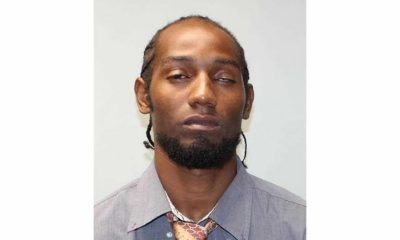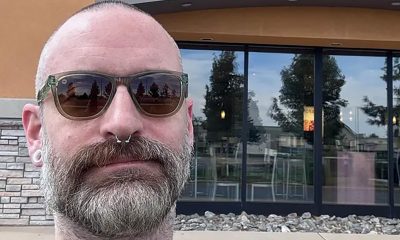Local
Murder suspect claims self-defense
Police say gay man stabbed 30 times, doused in bleach

A man charged in the Aug. 8 stabbing death of gay federal employee Delando King told police he acted in self-defense after King allegedly held a knife to his throat and threatened to kill him, according to a police affidavit filed in D.C. Superior Court.
The affidavit says defendant Marcus McLean, 24, a resident of Northeast D.C., initially denied knowing King and denied stabbing him inside King’s apartment at 1117 10th St., N.W., during the early morning hours of Aug. 8, when police believe the murder occurred.
“After being shown a still photograph of video footage showing defendant McLean and the decedent walking together at approximately 3 a.m. on Aug. 8, 2010, defendant McLean admitted that he stabbed the decedent inside the decedent’s apartment, but claimed it was in self-defense,” says the affidavit.
Police charged McLean with premeditated first-degree murder while armed after arresting him about 2:30 a.m. Saturday, Aug. 14, along the 2100 block of P Street, N.W., within a one-block radius of three gay bars.
King, 34, an employee of the U.S. Indian Health Service, was found dead in his apartment Aug. 9 by a building maintenance worker after a co-worker reported he had not shown up for work and could not be reached, a police statement said.
The affidavit says the Dupont Circle gay bar Omega played an important role in helping investigators solve the case by providing police with video surveillance showing King and McLean together at the club shortly before the murder took place.
It says findings of an autopsy conducted by the D.C. Medical Examiner’s office show that King “sustained about thirty (30) stab wounds, five of which penetrated the heart.”
Autopsy findings also show King suffered “chemical injuries and sustained several cuts to the arms and legs.” The affidavit says the chemical injuries appear to have been caused by the body being “doused with bleach” at the time of the murder.
Several of King’s belongings were stolen from the apartment at the time of the murder, according to the affidavit, including his computer, wallet and cell phone, and investigators noted that the bedroom where King’s body was found had been “searched” by the perpetrator.
The affidavit says McLean waived his right to remain silent and agreed to speak with detectives at the D.C. police’s Homicide Branch offices.
“Defendant McLean alleged that the decedent was forcing him to be a male prostitute,” says the affidavit. “According to defendant McLean, the decedent held a knife to the throat of defendant McLean in the early morning hours of August 8, 2010 and threatened to kill him. Defendant McLean claimed that he began to stab the decedent in the chest and then he (defendant McLean) blacked out and does not remember the remainder of the stabbing.
“Defendant McLean further stated that, after the stabbing, he hid the knife used to stab the decedent, took the decedent’s computer, cell phone, and wallet, and attempted to clean/remove his fingerprints from the apartment.”
Police believe the knife used to stab King is consistent with a knife missing from a knife set they found in King’s apartment.
The affidavit notes that King was 5 feet, 5 inches tall and weighed about 140 pounds at the time of his death. It says McLean is about 6 feet, 7 inches tall and weighs about 230 pounds.
McLean’s attorney, Kia Sears, could not be immediately reached for comment.
According to the affidavit, investigators used surveillance video provided by Omega bar to track the whereabouts of King and McLean on the night of the murder.
“The nightclub known as ‘Omega’ is an establishment frequented by members of the gay, lesbian, bisexual and transgender communities,” says the affidavit. “While viewing the video, investigators were able to determine that on Aug. 8, 2010, at approximately 1:27 a.m., the decedent and Marcus McLean were inside the establishment and that the decedent was in possession of his wallet.
“On Aug. 8, 2010, at approximately 2:45 a.m., the decedent’s check card was utilized at a bar known as The Passenger located near the intersection of Seventh and L streets, N.W., Washington, D.C.,” says the affidavit. “Shortly thereafter surveillance footage from the Washington, D.C. Convention Center captured the decedent and Marcus McLean walking from the direction of the above establishment towards the decedent’s apartment located near the intersection of 10th and L streets … The video captures the decedent and Marcus McLean holding hands while walking.”
Capt. Michael Farish of the police homicide branch told news reporters Aug. 10 that police were seeking help from the community in identifying a man captured on video surveillance cameras at King’s upscale condo building entering the building with King. The video surveillance also showed the then unidentified black man leaving the building less than an hour later carrying a bag that he did not have when he entered the building.
The affidavit, prepared several days after Farish spoke to reporters, says investigators obtained bank records showing that McLean used King’s bank card to make purchases at several stores in D.C. and Montgomery County, Md.
It also says that at about 12:52 p.m. on Aug. 8, just hours after the Medical Examiner believes King was stabbed to death, McLean “is captured in surveillance video utilizing the decedent’s check card at the Regal movie theater in Silver Spring, Maryland.”
“Marcus McLean is observed still wearing the same clothing and carrying the same lime green bag as in the lobby surveillance footage that captured him leaving the decedent’s building approximately nine hours earlier,” it says.
The police affidavit says police apprehended McLean at 2020 P St., N.W., which is the address of Marriott Residence Inn Hotel. Omega is located in an alley behind the hotel at 2122 P St., N.W.
Jason James, the Residence Inn’s desk manager, said Monday that no arrest took place at the hotel at that time. A police spokesperson familiar with the case could not be immediately reached to confirm the location of McLean’s arrest.
Court records show McLean is being held without bond and is scheduled for a preliminary hearing in D.C. Superior Court on Sept. 7.
Maryland
Md. Commission on LGBTQIA+ Affairs released updated student recommendations
LGBTQ students report higher rates of bullying, suicide

The Maryland Commission on LGBTQIA+ Affairs has released updated recommendations on how the state’s schools can support LGBTQ students.
The updated 16-page document outlines eight “actionable recommendations” for Maryland schools, supplemented with data and links to additional resources. The recommendations are:
- Developing and passing a uniform statewide and comprehensive policy aimed at protecting “transgender, nonbinary, and gender expansive students” against discrimination. The recommendation lists minimum requirements for the policy to address: name, pronoun usage, and restroom access.
- Requiring all educators to receive training about the specific needs of LGBTQ students, by trained facilitators. The training’s “core competencies” include instruction on terminology, data, and support for students.
- Implementing LGBTQ-inclusive curricula and preventing book bans. The report highlights a “comprehensive sexual education curriculum” as specifically important in the overall education curriculum. It also states the curriculum will “provide all students with life-saving information about how to protect themselves and others in sexual and romantic situations.”
- Establishing Gender Sexuality Alliances “at all schools and in all grade levels.” This recommendation includes measures on how to adequately establish effective GSAs, such as campaign advertising, and official state resources that outline how to establish and maintain a GSA.
- Providing resources to students’ family members and supporters. This recommendation proposes partnering with local education agencies to provide “culturally responsive, LGBTQIA+ affirming family engagement initiatives.”
- Collecting statewide data on LGBTQ youth. The data on Maryland’s LGBTQ youth population is sparse and non-exhaustive, and this recommendation seeks to collect information to inform policy and programming across the state for LGBTQ youth.
- Hiring a full-time team at the Maryland Department of Education that focuses on LGBTQ student achievement. These employees would have specific duties that include “advising on local and state, and federal policy” as well as developing the LGBTQ curriculum, and organizing the data and family resources.
- Promoting and ensuring awareness of the 2024 guidelines to support LGBTQ students.
The commission has 21 members, with elections every year, and open volunteer positions. It was created in 2021 and amended in 2023 to add more members.
The Governor’s Office of Communication says the commission’s goal is “to serve LGBTQIA+ Marylanders by galvanizing community voices, researching and addressing challenges, and advocating for policies to advance equity and inclusion.”
The commission is tasked with coming up with yearly recommendations. This year’s aim “to ensure that every child can learn in a safe, inclusive, and supportive environment.”
The Human Rights Campaign’s most recent report on LGBTQ youth revealed that 46.1 percent of LGBTQ youth felt unsafe in some school settings. Those numbers are higher for transgender students, with 54.9 percent of them saying they feel unsafe in school.
Maryland’s High School Youth Risk Behavior Survey reveals a disparity in mental health issues and concerns among students who identify as LGBTQ, compared to those who are heterosexual. LGBTQ students report higher rates of bullying, feelings of hopelessness, and suicidal thoughts. Nearly 36 percent of LGBTQ students report they have a suicide plan, and 26.7 percent of respondents say they have attempted to die by suicide.
The commission’s recommendations seek to combat the mental health crisis among the state’s LGBTQ students. They are also a call for local and state governments to work towards implementing them.
Virginia
Va. lawmakers consider partial restoration of Ryan White funds
State Department of Health in 2025 cut $20 million from Part B program

The Virginia General Assembly is considering the partial restoration of HIV funding that the state’s Department of Health cut last year.
The Department of Health in 2025 cut $20 million — or 67 percent of total funding — from the Ryan White Part B program.
The funding cuts started with the Trump-Vance administration passing budget cuts to federal HIV screening and protection programs. Rebate issues between the Virginia Department of Health and the company that provides HIV medications began.
Advocates say the funding cuts have disproportionately impacted lower-income people.
The Ryan White HIV/AIDS Program, a federal program started in 1990, provides medical services, public education, and essential services. Part B offers 21 services, seven of which remained funded after the budget cuts.
Equality Virginia notes “in 2025, a 67 percent reduction severely destabilized HIV services across the commonwealth.”
Virginia lawmakers have approved two bills — House Bill 30 and Senate Bill 30 — that would partially restore the funding. The Ryan White cuts remain a concern among community members.
Both chambers of the General Assembly must review their proposed changes before lawmakers can adopt the bills.
“While these amendments aren’t a full restoration of what community-based organizations lost, this marks a critical step toward stabilizing care for thousands of Virginians living with HIV,” said Equality Virginia Executive Director Narissa Rahaman. “Equality Virginia plans to continue their contact with lawmakers and delegates through the conference and up until the passing of the budget.”
“We appreciate lawmakers from both sides of the aisle who recognized the urgency of this moment and will work to ensure funding remains in the final version signed by the governor,” added Rahaman.
District of Columbia
D.C. Black Pride theme, performers announced at ‘Speakeasy’
Durand Bernarr to headline 2026 programming

The Center for Black Equity held its 2026 DC Black Pride Theme Reveal event at Union Stage on Monday. The evening, a “Speakeasy Happy Hour,” was hosted by Anthony Oakes and featured performances by Lolita Leopard and Keith Angelo. The Center for Black Equity organizes DC Black Pride.
Kenya Hutton, Center for Black Equity president and CEO, spoke following the performances by Leopard and Angelo. Hutton announced this year’s theme for DC Black Pride: “New Black Renaissance.”
Performers for 2026 DC Black Pride were announced to be Bang Garcon, Be Steadwell, Jay Columbus, Bennu Byrd, Rue Pratt and Akeem Woods.
Singer-songwriter Durand Bernarr was announced as the headliner for the 2026 festivities. Bernerr gave brief remarks through a video played on the screen at the stage.
DC Black Pride is scheduled for May 22-25. For more information on DC Black Pride, visit dcblackpride.org.




















